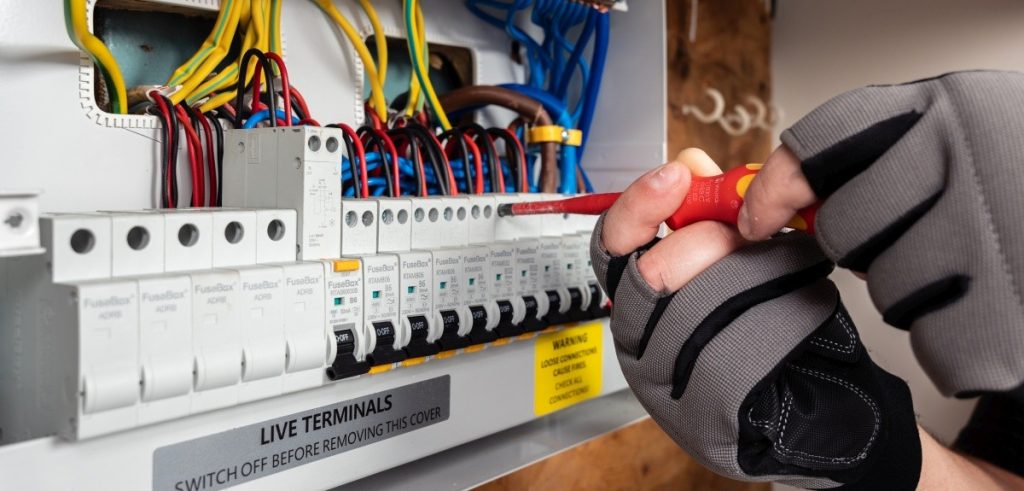Rewiring a house is a crucial investment for safety and efficiency. Old electrical wiring can pose significant risks, including fire hazards and power outages.
Whether you are renovating an old property or updating your current home, understanding the costs involved is essential. This guide provides a comprehensive overview of the expenses associated with rewiring a house in Scotland.
You can also speak to our specialist electrical contractors in Glasgow. We are a NICEIC-approved team and can help with expert advice as well as a bespoke, detailed quotation for your house rewiring work. Call 07377 519 529 or email info@inspireelectrics.com today.
The Average Cost To Rewire A House In Scotland
The average cost to rewire a house varies based on several factors. For a standard three-bedroom house, the cost typically ranges from £3,500 to £4,500.
Smaller properties, like one-bedroom flats, may cost between £2,000 and £3,000.
Larger homes or those with complex electrical systems can see prices upwards of £5,000. These estimates include labour, materials, and VAT. In the following section, we will discuss the various factors influencing the cost in detail. This will help you gain insights and make an informed decision.
Think your house needs rewiring? Inspire Electrics is here for quality electrical services tailored to your requirements.
Which Factors Impact The Cost?
Several factors influence the cost of rewiring a house in Scotland.
1. Property Size And Layout
The size and layout of a property play a significant role in determining rewiring costs. Larger homes with more rooms and intricate layouts require more wiring and labour to complete the project.
This increases both material expenses and the time needed for installation. Additionally, homes with multiple floors or detached structures may require additional wiring runs and access points, further influencing the overall cost. A reputable electrical team will provide tailored quotations based on your unique requirements and ensure all safety standards are met, including offering house rewiring safety tips.
2. Age And Condition of The Existing Wiring
The age and condition of the existing electrical wiring directly impact the complexity and cost of rewiring. Older properties often have outdated wiring that may not meet current safety standards.
Replacing old wiring involves more extensive work, including removing old materials and ensuring compatibility with modern electrical systems. Moreover, deteriorated wiring poses safety risks. This means thorough inspection and replacement will be necessary to mitigate hazards. A comprehensive electricity inspection and testing can help identify these issues early.
3. Accessibility
Properties with accessible wiring routes and clear pathways for installation generally incur lower labour costs. Conversely, homes with restricted access, such as those with concealed wiring or inaccessible crawl spaces, require more time and effort to complete the rewiring process.
This can increase labour expenses as electricians may need to create access points or employ specialised equipment to reach wiring in difficult-to-reach areas. Working with an experienced team ensures that all electrical services are carried out efficiently.
4. Materials And Fixtures
The choice of materials and fixtures used in rewiring impacts overall costs. Opting for high-quality wiring materials, such as copper conductors and durable insulation, ensures longevity and reliability but comes at a higher initial cost.
Similarly, installing modern electrical fixtures, such as energy-efficient lighting or smart home systems, adds to the total expense. These upgrades enhance functionality and increase the initial investment in rewiring projects.
5. Location
Geographic location and local market conditions influence rewiring costs. Urban areas with higher living expenses and demand for skilled labour generally have higher labour rates.
Additionally, remote or rural locations may incur additional transportation costs for materials and equipment. Understanding regional pricing variations helps homeowners anticipate and budget for differences in rewiring expenses based on their specific location within Scotland.
6. Additional Work
Additional electrical work beyond basic rewiring, such as installing new outlets, upgrading circuit breaker panels, or integrating home automation systems, contributes to higher project costs. Each additional task requires additional materials, labour, and potentially specialised expertise.
Homeowners should consider these supplementary services when estimating the overall cost of rewiring to ensure all electrical needs are addressed comprehensively during the project.
CONTACT INSPIRE ELECTRICS
Get Your Free Quote From Inspire Electrics
Contact our qualified team at Inspire Electrics today to receive a free quote tailored to your specific electrical house rewire needs. We specialise in identifying potential electrical hazards and making necessary upgrades accordingly.
Whether you need house rewiring or assistance from an emergency electrician. We ensure that you receive quality service with top-notch materials and a pristine finish at competitive pricing. Rest assured; we’ll offer a bespoke quotation within a 24-hour window.
Our work also follows a streamlined process. We leave your property as clean as we found it.
Call 07377 519 529 today and discover how we can enhance your home’s electrical safety and efficiency.
Conclusion
Rewiring a house is a significant investment that enhances safety and efficiency. Understanding the factors that influence the cost can help you budget appropriately. We hope this blog will get you started on the right foot.
For a reliable, professional service, consider our team at Inspire Electrics. Our competitive pricing and commitment to quality ensure your home’s electrical system is safe and up to date. Contact us today for a free, no-obligation quote.
Frequently Asked Questions [FAQs]
1. What is involved in a full house rewire?
A full house rewire involves replacing all electrical wiring, sockets, switches, and the consumer unit. It also entails installing new circuits for lighting, power outlets, and appliances and removing old wiring to ensure compliance with current safety standards.
2. How long should it take to rewire a house?
Rewiring a house typically takes 5 to 10 days, depending on the property’s size and complexity. Smaller homes may take around 5 days, while larger or more complex properties can extend to 10 days or more.
Factors such as accessibility and additional electrical work can also influence the duration.



